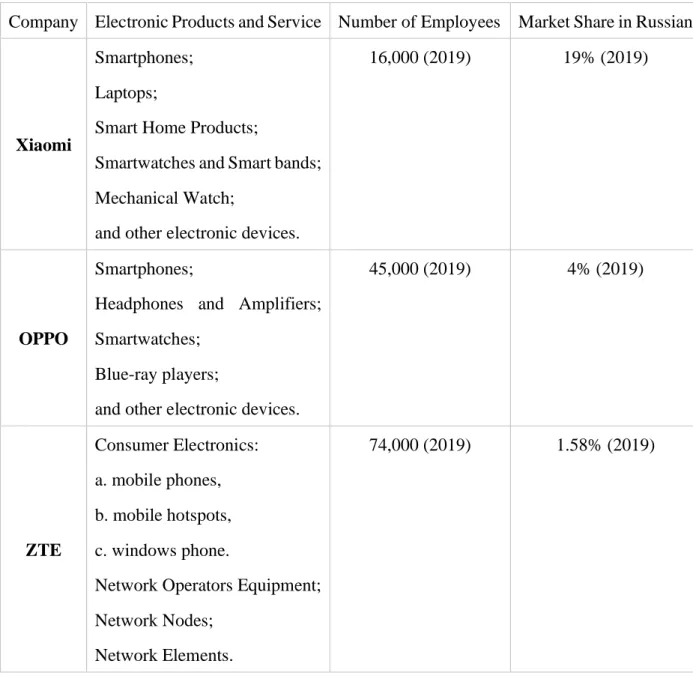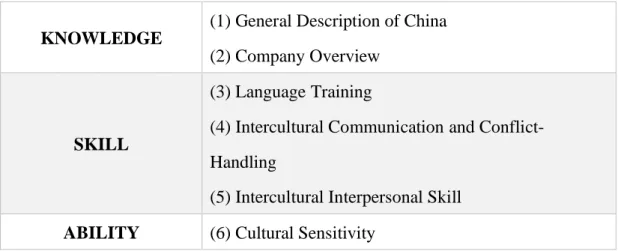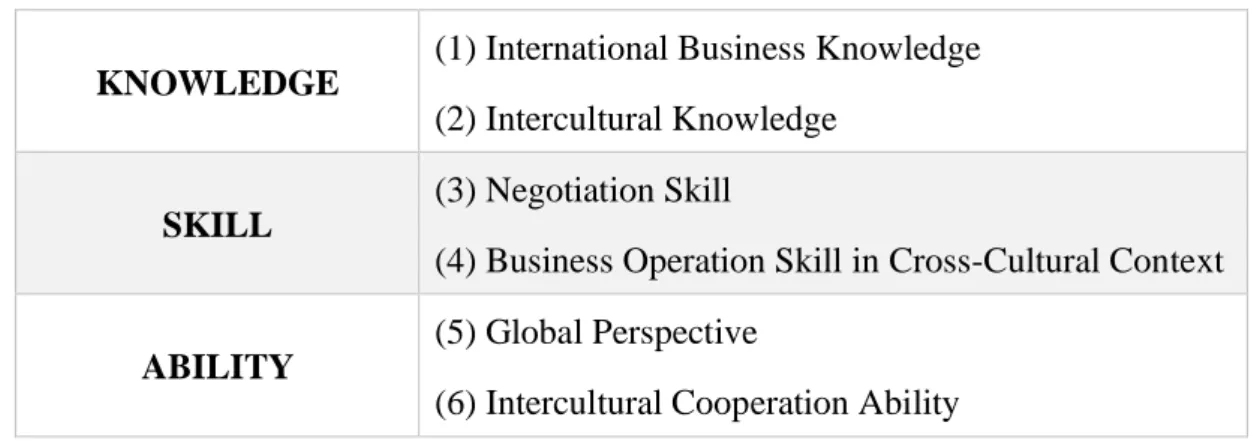Title Master Thesis A case study on intercultural training and intercultural adaptation: we take as an example Russian employees working in Chinese electronic companies. In addition, the rapid development of China's electronics industry has attracted an increasing number of Russian workers to work there. Therefore, in this study, the author applies multiple case studies, the questionnaire survey and the in-depth interviews, conducting in-depth research on the cross-cultural training practices adopted by Chinese electronic companies for their Russian employees.
It identifies three factors that influence intercultural competence, some common practices of intercultural training in terms of both content and method, challenges for Russian employees in participating in intercultural training, and possible solutions.
INTRODUCTION
Relevance of the Research
What they emphasize is that all managers must promote culture learning throughout their company. Furthermore, cultural learning should be incorporated into the human resources development strategies of all global organizations (Harris & Moran, 1996). Therefore, the cross-cultural adjustment of foreign employees is closely linked to the success of their business. These companies should attach great importance to intercultural training for their foreign employees so that they can adapt to cultural differences and develop intercultural competence.
What Black and Mendenhall believe is that intercultural training plays an important role in the development of cultural understanding, which can help foreign employees to focus on potential cultural mistakes (Black & . Mendenhall, 1990).
Research Gap
Furthermore, there do not seem to be many empirical studies on the attitudes of Chinese electronics companies toward cross-cultural training, let alone research on Russian employees. Consequently, it is worthwhile to target Russian employees working in Chinese electronics companies as our research targets. Thus, there is a close relationship between cross-cultural training, cross-cultural adaptation and Russian employees working in Chinese electronic companies.
Therefore, in this research, a case study on Russian employees working in Chinese electronic companies is necessary to gather more empirical evidence on this issue.
Research Questions and Aims of the Research
THEORETICAL OVERVIEW
Intercultural Orientations
A review of the results from China and Russia reveals sufficient variability to believe that cross-cultural errors may occur when Russian employees work in Chinese electronics companies. Therefore, Russian employees from a culture with higher individualism are less emotionally dependent on work. Chinese and Russian employees may differ greatly in their acceptance of the role of flexibility, change and risk.
Therefore, based on these differences within national cultures, it is expected that cross-cultural training for Russian employees working in Chinese electronic companies is very necessary and crucial.
Intercultural Competence Models
However, the results of most studies are not unified within a conceptual framework of intercultural competence. Some scholars have considered intercultural competence as a set of abilities (Abe & Wiseman, 1983; Dean & Popp, 1990), a list of behaviors (Martin & Hammer, 1989) and a set of dimensions for intercultural effectiveness (Cui & Awa , 1992) ). Therefore, to better research intercultural competence of Russian employees working in.
Based on this Model, the questionnaire will be conducted to collect data on the intercultural competence of Russian employees working in Chinese electronic companies, which facilitates further research.
Cross-Cultural Adaptation
In fact, in intercultural adaptation, intercultural orientation is considered as a kind of "knowing/knowing", while intercultural competence is a kind. In this case, an interculturally competent person is able to establish effective interactions with foreigners, which means that intercultural competence is crucial for an individual in intercultural adaptation. More importantly, intercultural competence is not an inherent nature, nor does it happen by chance, but rather an acquired quality (Beamer, 1992; Hammer et al., 2003; Kupka, 2007).
Therefore, in order to better adapt to the cross-cultural differences of Russian employees, Chinese electronic companies must attach great importance to cross-cultural training and use more effective programs on it.
MULTIPLE CASE STUDIES
- Questionnaire
- Interview
- Data Analysis
- Validity and Reliability
Last but not least, using the Likert scale, a closed questionnaire was developed based on the Integrated Intercultural Competence Model. That is, based on the valid number of respondents' questionnaires, Xiaomi, OPPO and ZTE are the 3 most representative companies for further survey and interview research. The Xiaomi corporation, specializing in electronic products and services, is the fourth largest smartphone manufacturer in the world.
It is the top smartphone brand in China and ranked fifth in the world in 2019. On the other hand, it is a more controlled way to determine the overall direction of the interview. Therefore, this study used a semi-structured interview as a tool to collect data from key informants, and our results are based on the responses of a single interviewee in each company.
Most importantly, these three Russian representatives all achieved a high score on the questionnaire survey. She is an Online Mall Manager at OPPO and has 3 years of work experience in the electronics industry. That's why he lived in China for six years with three years of experience in the electronics sector.
Moreover, it is of course necessary to review the documents several times and examine some problems and reasons based on the research questions. And the case studies are based on three major Chinese electronics companies of great research importance.

FINDINGS
- Influencing Factors on Intercultural Competence of Russian Employees
- Within Case Analysis
- Cross-Case Analysis
- Challenges for Russian Employees Working in Chinese Electronic
Xiaomi attaches great importance to all kinds of talent training, therefore the intercultural training of foreign employees is no exception. Moreover, one of Xiaomi's most distinctive forms of cross-cultural training is the regular reporting seminar of foreign employees. And that is why our company attaches great importance to the issues of intercultural training for Russian employees.”.
How to design intercultural training methods to enhance the intercultural competence of Russian employees is one of the important issues for Chinese electronic companies. The purpose of intercultural training based on lectures is often to increase the intercultural knowledge of foreign employees. Of these three Chinese electronic companies, OPPO better capitalizes on the benefits of this cross-cultural training mode.
This type of intercultural training method pays more attention to the analysis of cultural conflict events. In addition, Chinese electronic companies usually use all modes of cross-cultural training based on lectures, analysis and practice. Therefore, the common cross-cultural training practices used by Chinese electronic companies for their Russian employees are completed in terms of both content and method.
After analyzing these three representative cases, there are also some challenges for Russian employees working in Chinese electronics companies to attend intercultural training. It is found that almost every Chinese electronics company has offered several intercultural training courses for Russian employees, but in reality there are few Russian employees who actively attend this intercultural training. For example, most Chinese electronics companies prefer to choose the traditional lecture-based intercultural training for their Russian employees.
The same problem also occurs in the development of intercultural training of Chinese electronics companies, so it is necessary to hire intercultural training experts for their Russian employees.

CONCLUSION
Results and Discussion
It is a traditional cross-cultural training mode with the advantage of simple material, low cost and strong relevance, so it is popularly adopted by Chinese electronic enterprises. Regarding the challenges faced by Russian employees in participating in intercultural training, there are several aspects that should be improved by Chinese electronic companies. It is obvious that very heavy workload for employees working in Chinese electronic companies, which not only reduces their chances to attend courses, but also increases their willingness to turnover.
From the point of view of Russian employees, most of the intercultural training programs used by their companies are boring and outdated. There are some up-to-date and effective cross-cultural training programs for cross-cultural adaptation that Chinese electronics companies should take note of. It is more attractive for Russian employees to attend training based on practice rather than lectures.
Range of training time reasonable and the introduction of a reward system can contribute to improve employee involvement in intercultural training. On the other hand, in addition to boring training contents and limited learning time, the lack of incentives from the company is another reason of the low participation of intercultural training. Therefore, material and spiritual rewards are needed to motivate employees to attend intercultural training programs.
The company should not only emphasize the importance of intercultural learning, but also motivate its employees with a reward system. Comparing the employee's intercultural competence before and after participating in training is necessary to test and improve the intercultural training programs.

Implication
Limitations and Further Research Direction
Please take a few moments to reflect on intercultural competence and intercultural adaptation of yourself. Do you see your company as a multicultural work environment that places great importance on intercultural competence and intercultural adaptation of employees? If you are the boss of your company, what intercultural training programs would you have for your Russian employees in the field of intercultural adaptation.
Beyond Czech and Slovak differences in Hofstede's Masculinity Index: An examination of cross-cultural differences using Hofstede and Schwartz's framework[J]. The relationship between self-directed learning willingness and intercultural adaptability among expat managers in the United States[D]. Sensitivity to language-based rejection in intercultural communication: the role of language mindsets and implications for migrants' intercultural adjustment[J].
The perception of intercultural communication competence by American and Russian managers with experience in multicultural teams[D]. The relationship between state fragility and Hofstede's index of cultural distance to expatriates' intercultural adjustment [M]. Managing intercultural communication in multicultural construction project teams: the case of Kenya and Britain[J].
Research into the problems and countermeasures of staff training in spic under the cross-cultural background[D]. The relationship between intercultural communication competence with stress and coping with stress as reported by international students[J].